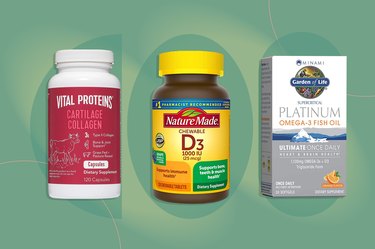
If you reached a point in your life where tendonitis happens on the regular, then you might be continually looking for relief. Tendonitis is inflammation in a tendon in your body, and it can cause a lot of pain and discomfort.
Glucosamine is often marketed as an over-the-counter tendonitis treatment for achy and inflamed joints, but does it really work? There are some conflicting views on this supplement, so the choice to use it largely depends on if you believe the hype.
Video of the Day
Video of the Day
What Is Glucosamine?
Glucosamine is naturally present in the body as a part of the cartilage that cushions the joints and other connective tissues, according to the Mayo Clinic. Glucosamine in supplement form is typically produced from shellfish. Vegan forms are also available and can be made from corn.
There are multiple supplement forms available, but glucosamine sulfate is the type typically used for pain reduction.
The majority of the studies with glucosamine pair it with chondroitin and have been mainly focused on relief and treatment from osteoarthritis — most notably knee osteoarthritis, according to a January 2022 review in Arthroscopy and Sports Medicine.
Should You Take Glucosamine for Tendonitis?
Tendonitis can happen to anyone, but it usually happens when you stress one part of the body with repetitive movements, like painting or gardening, or movements in sports like playing tennis (read: tennis elbow) or pitching in baseball.
You irritate or inflame the connective tissue (your tendon) between the muscle and the bone, according to the Cleveland Clinic.
"Research studies on its effectiveness in treating joint pain — specifically related to arthritis — are mixed, with [some] studies showing it is no better than placebo," Dena Barsoum, MD, physiatrist and sports medicine specialist at Hospital for Special Surgery, tells LIVESTRONG.com.
"I typically do not recommend glucosamine based on these studies," Dr. Barsoum says. However, "When patients ask about glucosamine to treat joint pain (usually in the context of arthritis), I advise that while studies show mixed results, some patients do find it helpful."
It is hypothesized that glucosamine helps to decrease inflammation and prevent collagen degradation, according to the National Center for Biotechnology Information.
While this may help with relief from the inflammatory process of tendonitis, there is no indication — or research suggesting — that glucosamine can prevent or treat tendonitis.
Only one animal study from 2015 has looked at the association between treatment with glucosamine and tendon health, but the results cannot be extended to tendonitis in humans. The methods used are not applicable to human tendonitis and the dose used on rabbits was much higher than a human would ingest per day.
What to Look for in a Glucosamine Supplement
If you want to try a glucosamine supplement to see if it can work for tendonitis, there are some things to remember when choosing a supplement off the shelf.
The National Center for Biotechnology Information indicates that glucosamine supplements are safe to take for most adults.
"The most common side effect is mild GI upset, which is usually alleviated by taking glucosamine with food," Dr. Barsoum says.
If you have diabetes or are on blood-thinning medication, speak with your doctor to ensure glucosamine supplements are right for you, or if an alternative method may better suit your needs.
How We Make Supplement Recommendations
Each of the supplement recommendations have been researched to ensure they meet the quality standards for dietary supplements. The glucosamine supplements below have all been third-party tested for purity and quality of their ingredients.
1. Third Party-Testing
This should be your first check. Dietary supplements are not tightly regulated by the Food and Drug Administration.The best the FDA can do is provide a quality control system called Current Good Manufacturing Practices (CGMPs). All supplement companies should be adhering to this minimal standard (and they should say so on the label).
Some companies choose to have their products tested by third parties to ensure that the supplement is cleared for safe consumption, meaning it contains what it says, in the proper amounts, and doesn't contain anything you don't want — like heavy metals.
There are multiple third-party testers, but the big three are USP, Consumer Lab and NSF, which also includes NSF for Sport. Supplement companies will often put the seal of third-party testing directly on the bottle, and you can also find information about testing on their websites.
2. Minimal Fillers
Fillers often become problematic if you're unaware of an ingredient in the product you're taking. If you turn the bottle over and there is an ingredient you don't recognize, look it up and find out why it's in there.
Fillers can be added for many reasons, to create bulk, as a preservative or in the coating. Always look for potential allergens or for ingredients that you wish to avoid, such as gelatin, soy, gluten or added sugar.
3. Dosage
The typical dosage of glucosamine used in research is around 1,500 mg/day for adults. This is also the dose you will often see in over-the-counter supplements.
Glucosamine Supplements to Try
- Kirkland Signature Glucosamine and Chondroitin: Costco.com; Price: $24.49 for a 110-day supply
- Deva Vegan Glucosamine: Amazon.com; Price: $11.68 for a 30-day supply
- Member's Mark Glucosamine Chondroitin: SamsClub.com; Price: $26.78 for a 170-day supply
Alternatives and Safety Concerns
Dr. Barsoum also suggests alternatives to glucosamine for tendon health: "Supplements with anti-inflammatory effects, such as turmeric and fish oil, can be helpful for joint and tendon pain and inflammation," she says.
"Prior to taking these, however, it is important to discuss with your primary care physician as they can also thin a patient's blood and could interact with other medications."
In addition, "glucosamine can worsen glaucoma and may cross-react if a patient has a shellfish allergy," explains Dr. Barsoum.
As always with any supplements taken, speak with your primary health care provider if you think glucosamine might be a good option to help alleviate your symptoms from tendonitis.
Gentle rehabilitative exercises can also help relieve tendonitis, so speak to your doctor or physical therapist to develop a program that works for you.
And as the old saying goes, an ounce of prevention is worth a pound of cure. With that in mind, Dr. Barsoum sends out this reminder: "Maintaining a healthy weight and living an active lifestyle are the most important steps we can take to improve bone, joint and tendon health."
- Mayo Clinic: "Glucosamine"
- Joint Diseases & Related Surgery: "Glucosamine-Chondroitin Sulphate Accelerates Tendon-to-Bone Healing in Rabbits"
- Cleveland Clinic: "Tendinitis"
- FDA: "Facts About the Current Good Manufacturing Practices"
- NCBI: "Glucosamine Sulfate"
- Arthroscopy and Sports Medicine: "Efficacy and Safety of the Combination of Glucosamine and Chondroitin for Knee Osteoarthritis: A Systematic Review and Meta‑analysis"
Was this article helpful?
150 Characters Max
0/150
Thank you for sharing!
Thank you for your feedback!
Is this an emergency? If you are experiencing serious medical symptoms, please see the National Library of Medicine’s list of signs you need emergency medical attention or call 911.


